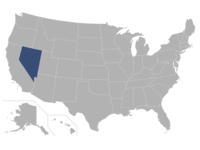Feds list Dixie Valley toad, found only in Nevada, as endangered

A rare Nevada toad at the center of a lawsuit over a geothermal energy project will be listed under the Endangered Species Act, federal wildlife managers said Thursday.
The U.S. Fish and Wildlife Service announced the Dixie Valley toad will be listed as endangered and provided permanent federal protections. The toad was protected under a rare emergency order in April, and those emergency protections expire Dec. 2.
Following a review of the best available scientific information, wildlife officials determined the Dixie Valley toad, the smallest of the western toads, is at risk of extinction without federal intervention.
“This listing highlights the importance of the Endangered Species Act, and efforts to conserve species like the Dixie Valley toad before population declines become irreversible,” said USFWS Director Martha Williams in a statement. “The Service remains committed to working with our Tribal, federal, state and private partners to conserve rare species and preserve Nevada’s unique biodiversity, while also supporting the need for sustainable renewable energy projects on public land,” added Williams.
Under the listing, federal land managers will need to consult with USFWS about actions needed to comply with the Endangered Species Act.
The recently discovered species of toad is unique to Nevada. Its only known habitat is restricted to 760-acres of wetland habitat fed by hot springs in the remote Dixie Valley northeast of Fallon, Nevada.
Primary threats to the Dixie Valley toad include geothermal development, disease, predation by other non-native frog species, groundwater pumping for human and agricultural use and climate change, said USFWS.
Last December, the Fallon Paiute-Shoshone Tribe in Churchill County and the Center for Biological Diversity sued the U.S. Bureau of Land Management over its approval of a geothermal energy project, which they say would damage a nearby spring considered sacred to tribes and endanger the rare desert toad.
The proposed project by Reno-based Ormat Technologies would include two geothermal power plants, 18 or more geothermal wells, access roads, and 48 miles of transmission line on about 2,000 acres of public land in Dixie Valley in north-central Nevada, adjacent to the Dixie Meadows Hot Springs.
Dixie Valley is the traditional homeland of the Fallon Paiute-Shoshone Tribe. The hot springs are considered a sacred site to the tribe. The spring is culturally and religiously significant to their way of life, Fallon Paiute-Shoshone Tribal Chairwoman Cathi Tuni said.
“The Dixie Meadows hot springs, the wetlands and surrounding area, and our animal relatives who rely on that unique ecosystem is all part of a sacred place the Tribe has valued for thousands of years,” said Tuni in a statement. “The fact that scientists are now realizing the toad only lives in this one place confirms what the Tribe has long known: how special it is and how important it is to preserve. We appreciate the Service’s support of the Tribe and its adherence to its trust duties and statutory duties, even in the face of intense pressure.”
Philip Johnson, a council member for the Fallon Pauite-Shoshone Tribe, called the listing “a great win for our tribe.”
“As the original stewards of the land, we have a responsibility to the toad and the environment to make sure they are both protected. The listing is a big step towards accomplishing that goal,” Johnson continued.
Conservation biologists worry that any groundwater loss or change in the temperature of the hot springs caused by the plant could harm the toad and expose it to parasites that cannot otherwise withstand the high temperatures of the spring.
“Dixie Valley toads are among the most vulnerable amphibians in the United States, and I’m relieved they’re getting the life-saving protections they need,” said Patrick Donnelly, Great Basin director at the Center for Biological Diversity in a statement. “We’re pleased that the Biden administration is taking this essential step to prevent the extinction of an irreplaceable piece of Nevada’s special biodiversity.”
Attorneys for the Center for Biological Diversity and the Fallon Paiute-Shoshone Tribe previously succeeded in getting a district judge to temporarily pause construction of the project, but the ruling was later overturned by an appellate court.
Months later, USFWS announced the agency would move to protect the toad under the Endangered Species Act on an emergency basis. A legal agreement between project opponents and the geothermal developer Ormat Nevada Inc, in August halted any further construction on the plant while risks to the endangered Dixie Valley toad were evaluated.
The merits of the case and whether BLM erred in approving the geothermal project are still undecided and ongoing.
Representatives for Ormat did not respond to requests for comment in time for publication. Business leaders for Ormat have previously said they don’t believe an endangered listing by the USFWS will impact the project’s construction.
Paul Thomsen, the vice president of business development for Ormat, told the Current in April that the renewable energy company has “long recognized the importance of conserving the Dixie Valley Toad” and has developed a mitigation plan it believes “adequately protects the Dixie Valley toad regardless of its legal status.”
“This is a significant victory in the fight against the extinction crisis in Nevada,” said Donnelly. “Renewable energy is essential to combating the climate emergency, but it can’t come at the cost of extinction.”
Editor’s note: This article was updated with a statement from Fallon Paiute-Shoshone Tribal Chairwoman Cathi Tuni and Fallon Paiute-Shoshone Tribe Council Member Philip Johnson.








